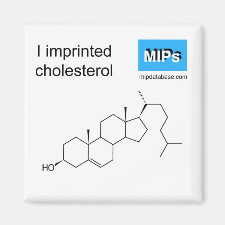
Authors: Wen YL, Chen L, Zhou L, Leng F, Yang ZY, Yu C
Article Title: Bionic receptor for atherosclerosis therapy: Molecularly imprinted polymers mediate unique cholesterol efflux and inhibit inflammation.
Publication date: 2022
Journal: Chemical Engineering Journal
Volume: 430
Article Number: 132870.
DOI: 10.1016/j.cej.2021.132870
Alternative URL: https://www.sciencedirect.com/science/article/pii/S1385894721044454
Abstract: In this study, we report a novel strategy for reducing lipid levels through artificial receptor-mediated cholesterol efflux and promoting anti-inflammatory activity that is based on molecularly imprinted ceria nanocomposites (CeO2@MIP). The material was developed by imprinting cholesterol on the surface of CeO2 through radical polymerization of functional monomers. The imprinted molecules provide physicochemical properties that perfectly match the polarities and condensed ring structure of cholesterol, thus allowing easy binding to plaque sites and intracellular cholesterol. Due to its nanosize, CeO2@MIP promotes cholesterol efflux through exocytosis without stimulating cholesterol-related signaling pathways, and transports the cholesterol-CeO2@MIP complex to the liver via the mononuclear phagocytosis system. As a modular structure, CeO2 nanoparticles reduce the inflammatory response of lipid activation through their enzyme-mimicking activity. The local anti-inflammatory and cholesterol-lowering abilities of CeO2@MIP have been demonstrated in ApoE-/- atherosclerosis mice. During the treatment, no obvious side effects were observed. We believe that the new MIP-based method provides promising guidance for the treatment of atherosclerosis and other lipid-related diseases
Template and target information: cholesterol
Author keywords: Molecularly imprinted polymers, Cerium oxide nanoparticles, Cholesterol metabolism, Anti-inflammatory activity, Atherosclerosis



Join the Society for Molecular Imprinting

New items RSS feed
Sign-up for e-mail updates:
Choose between receiving an occasional newsletter or more frequent e-mail alerts.
Click here to go to the sign-up page.
Is your name elemental or peptidic? Enter your name and find out by clicking either of the buttons below!
Other products you may like:
 MIPdatabase
MIPdatabase









